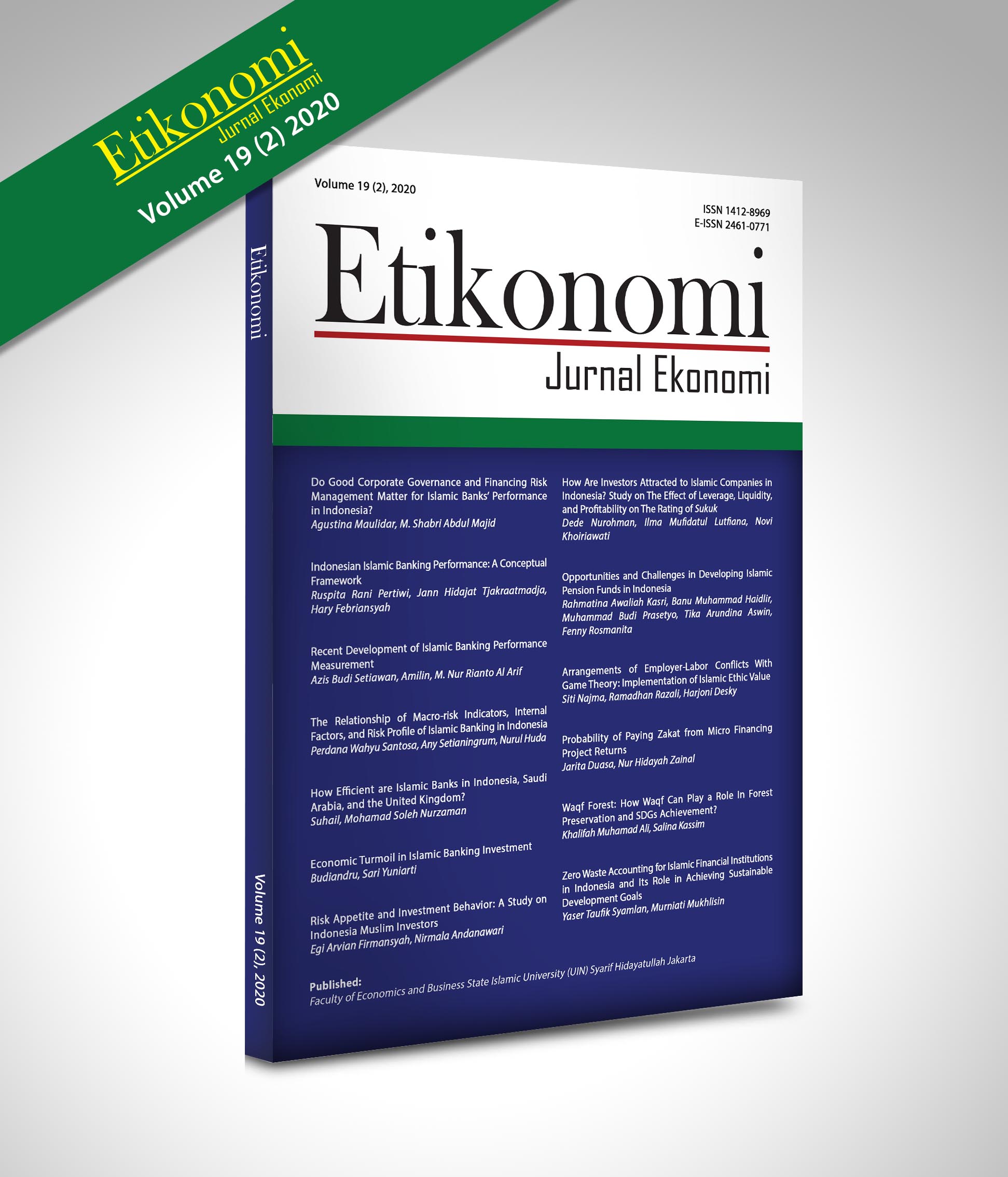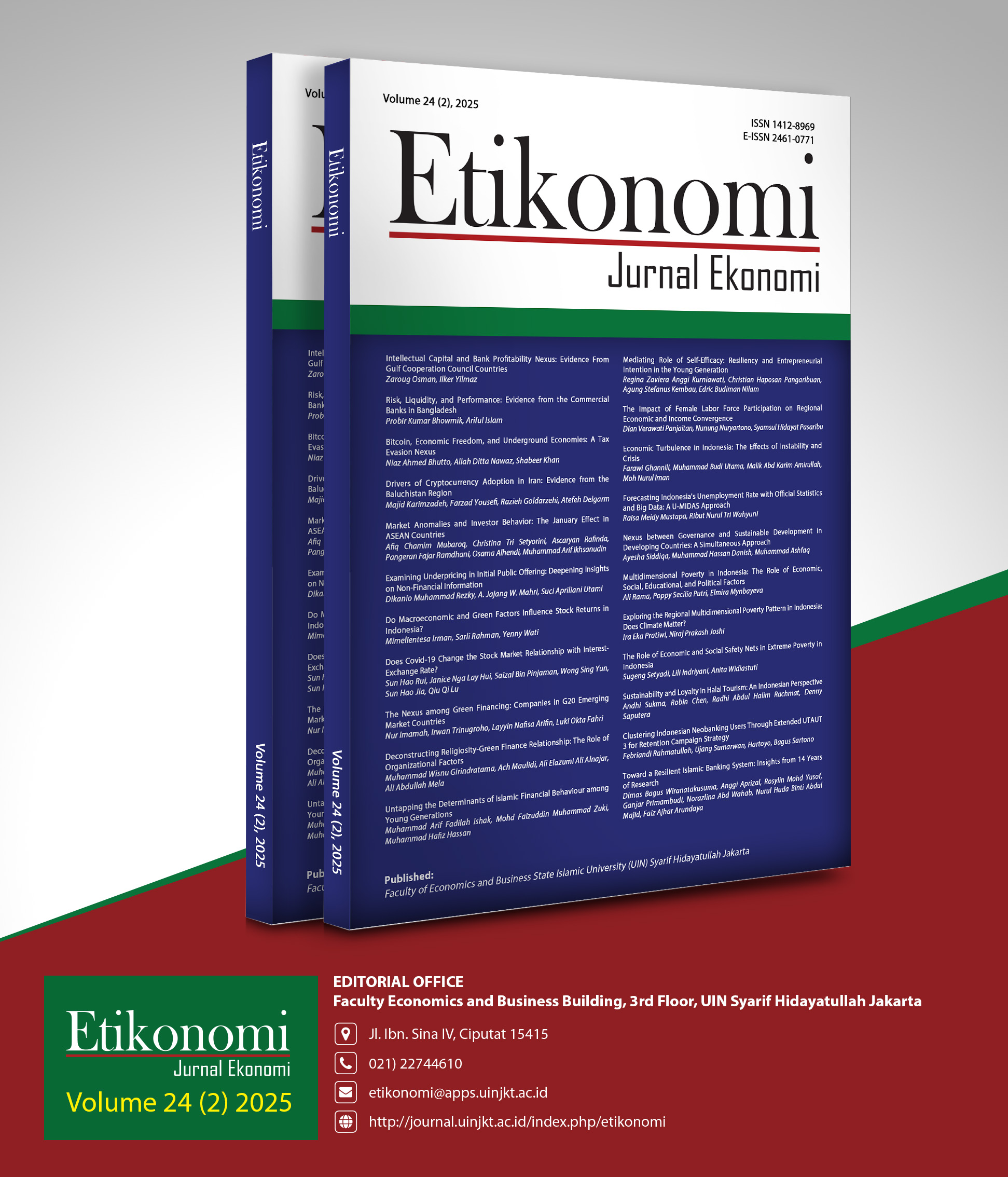The Relationship of Macro-risk Indicators, Internal Factors, and Risk Profile of Islamic Banking in Indonesia
DOI:
https://doi.org/10.15408/etk.v19i2.15528Keywords:
Islamic bank, macroeconomic, bank health, non-performing financingAbstract
This study is essential because Islamic banks have a higher NPF level than conventional banks and examine whether macroeconomic indicators (macro-risk), internal factors of banking (GCG-earnings-capital) risk profile correlate term Indonesian Islamic banking. The method used is the correlation analysis involving four macro-risk variables (Forex; BI rate; Inflation and GDP), three GEC variables (GCG; ROA, and CAR), and two risk profiles (FDR and NPF). The number of samples is the ten largest Indonesia sharia commercial banks with the 2011-2018 periods. This research finds that macroeconomic indicators positively correlate to non-performing financing (NPF). The GEC positively correlates to NPF and FDR; GEC is negatively correlated to macro-risk indicators. However, some indicators are negatively correlated, such as GDP-corporate governance, Forex-profitability, GDP-efficiency, BI rate-capital, and profitability-NPF. The study proposed managerial implications to understand the relationship between macroeconomic, internal factors, and risk profile in Islamic bank lending.
JEL: D02; G21, G32
How to Cite:
Santosa, P. W., Setianingrum, A., & Huda, N. (2020). The Relationship of Macro-risk Indicators, Internal Factors and Risk Profile of Islamic Banking in Indonesia. Etikonomi: Jurnal Ekonomi, 19(2), 221-236. https://doi.org/10.15408/etk.v19i2.15528.
Downloads
References
Abbas, F., Iqbal, S., & Aziz, B. (2019). The Impact of Bank Capital, Bank Liquidity and Credit Risk on Profitability in Postcrisis Period: A Comparative Study of US and Asia. Cogent Economics and Finance, 7(1), 1–18. https://doi.org/10.1080/23322039.2019.1605683
Al-Homaidi, E. A., Tabash, M. I., Farhan, N. H. S., Almaqtari, F. A., & McMillan, D. (2018). Bank-Specific and Macro-economic Determinants of Profitability of Indian Commercial Banks: A Panel Data Approach. Cogent Economics & Finance, 6(1), 1548072. https://doi.org/10.1080/23322039.2018.1548072
Al‐Homaidi, E. A., Tabash, M. I., Farhan, N. H., & Almaqtari, F. A. (2019). The Determinants of Liquidity of Indian Listed Commercial Banks: A Panel Data Approach. Cogent Economics and Finance, 7(1), 1–20. https://doi.org/10.1080/23322039.2019.1616521
Alshammari, T. (2017). Performance Differences Between Islamic and Conventional Banking Forms. Banks and Bank Systems, 12(3), 237–246. https://doi.org/10.21511/bbs.12(3-1).2017.08
Alzoubi, T. (2017). Determinants of Liquidity Risk in Islamic Banks. Banks and Bank Systems, 12(3), 142–148. https://doi.org/10.21511/bbs.12(3).2017.10
Anggraeni, T. (2010). Pengaruh Pembiayaan Bermasalah dan Faktor Eksternal terhadap Tingkat Kesehatan Bank Syariah X (The Effect of Non Performing Financing and External Factors on the Soundness of Islamic Banks). Jurnal Dikta Ekonomi, 7(1), 37–52.
Apriadi, I., Sembel, R., Santosa, P. W., & Firdaus, M. (2016). Banking Fragility in Indonesia: A Panel Vector Autoregression Approach. International Journal of Applied Business and Economic Research, 14(14), 1193–1224.
Apriadi, I., Sembel, R., Santosa, P. W., & Firdaus, M. (2017). Kompetisi dan Stabilitas Perbankan di Indonesia: Suatu Pendekatan Analisis Panel Vector Autoregression (Banking Competition and Stability in Indonesia: A Panel Vector Autoregression Analysis Approach). Jurnal Manajemen, 21(1), 33-54. https://doi.org/10.24912/jm.v21i1.146
Asnaini, S. W. (2014). Faktor-faktor yang Mempengaruhi Non-performing Financing pada Bank Umum Syariah di Indonesia (Factors Affecting Non-performing Financing at Islamic Commercial Banks in Indonesia). Jurnal TEKUN, 2(2), 264–280.
Dahir, A. M., Mahat, F., Razak, N. H. A., & Bany-Ariffin, A. N. (2019). Capital, Funding Liquidity, and Bank Lending in Emerging Economies: An Application of the LSDVC Approach. Borsa Istanbul Review, 19(2), 139–148. https://doi.org/10.1016/j.bir.2018.08.002
Do, H. L., Ngo, T. X., & Phung, Q. A. (2020). The Effect of Non-performing Loans on Profitability of Commercial Banks: Case of Vietnam. Accounting, 6(3), 373–386. https://doi.org/10.5267/j.ac.2020.1.001
Donath, L., Cerna, V., & Oprea, I. (2014). Macroeconomic Determinants of Bad Loans on Baltic Countries and Romania. SEA- Practical Application of Science, 2(4), 71–77.
Duraj, B., & Moci, E. (2015). Factors Influencing the Bank Profitability: Empirical Evidence from Albania. Romanian Economic and Business Review, 5(3), 483-494.
Dzingai, I., & Fakoya, M. B. (2017). Effect of Corporate Governance Structure on the Financial Performance of Johannesburg Stock Exchange (JSE)-Listed Mining Firms. Sustainability, 9(6), 867-881. https://doi.org/10.3390/su9060867
Firmansyah, I. (2014). Determinant of Non-Performing Loan: The Case of Islamic Bank in Indonesia. Buletin Ekonomi Moneter Dan Perbankan, 17 (2), 233–247.
Hugonnier, J., & Morellec, E. (2017). Bank Capital, Liquid Reserves, and Insolvency Risk. Journal of Financial Economics, 125(2), 266–285. https://doi.org/10.1016/j.jfineco.2017.05.006
Ijaz, S., Hassan, A., Tarazi, A., & Fraz, A. (2020). Linking Bank Competition, Financial Stability, and Economic Growth. Journal of Business Economics and Management, 21(1), 200–221. https://doi.org/10.3846/jbem.2020.11761
Ikram, A., Su, Q., Ijaz, F., & Fiaz, M. (2016). Determinants of Non-Performing Loans: an Empirical Investigation of Bank-Specific Microeconomics Factors. The Journal of Applied Business Research, 32(6), 1723– 1736.
Jacob, S. (2019). Effects of Macro Economic Forces on Corporate Governance Performance of Indian Companies: An Exploratory Study. retrieved from https://papers.ssrn.com/sol3/papers.cfm?abstract_id=3491556.
Jacoub, Y., Hakim, D. B., Hartoyo, S., & Santosa, P. W. (2020a). Does Acquisition Improve Indonesian Bank Financial Performance? International Journal of Business and Applied Social Science, 6(3), 51–62. https://doi.org/10.33642/ijbass.v6n3p5
Jacoub, Y., Hakim, D. B., Hartoyo, S., & Santosa, P. W. (2020b). Karakteristik Bank Target Akuisisi Asing (cross-border) dan Domestik Pada Perbankan Indonesia (Characteristics of Foreign (cross-border) and Domestic Acquisition Target Banks in Indonesian Banking). MIX Jurnal Ilmiah Manajemen, 10(2), 224–236. https://doi.org/dx.doi.org/10.22441/mix.2020.v10i2.006 224
Jumono, S., Sugiyanto, S., & Mala, C. M. F. (2020). Mobilization of Funds in Indonesian Regional Banking. Management Science Letters, 10(2), 295–302. https://doi.org/10.5267/j.msl.2019.9.002
Kartikasary, M., Marsintauli, F., Serlawati, E., & Laurens, S. (2020). Factors Affecting the Non-performing Loans in Indonesia. Accounting, 6(2), 97–106. https://doi.org/10.5267/j.ac.2019.12.003
Khemraj, T., & Pasha, S. (2009). The Determinants of Non-performing loans: an econometric case study of Guyana. Retrieved from http://mpra.ub.uni-muenchen.de/53128/ MPRA Paper No. 53128.
Klein, N. (2013). Non-performing Loans in CESEE: Determinants and Impact on Macroeconomic Performance. IMF Working Paper No. WP/13/72.
Kusuma, S. I., & Atahau, A. D. R. (2019). Islamic Commercial Banks and Sharia Business Units: How Efficient Are They? Jurnal Organisasi dan Manajemen, 15(2), 141–152. https://doi.org/10.33830/jom.v15i2.733.2019
Leka, B., Bajrami, E., & Duci, E. (2019). Key Macroeconomic Drivers on Reducing Non Performing Loans in Albania. Academic Journal of Interdisciplinary Studies, 8(2), 88–95. https://doi.org/10.2478/ajis-2019-0020
Mishkin, F. S., & Eakins, S. G. (2012). Financial Market and Institutions (Seventh). New York: Prentice-Hall.
Mukhibad, H., Nurkhin, A., & Rohman, A. (2020). Corporate Governance Mechanism and Risk Disclosure by Islamic Banks in Indonesia. Banks and Bank Systems, 15(1), 1–10. https://doi.org/10.21511/bbs.15(1).2020.01
Muthamimah, C. (2014). Analisis Eksternal dan Internal dalam Menentukan Non Performing Financing Bank Umum Syariah di Indonesia (External and Internal Analysis in Determining Non Performing Financing for Islamic Commercial Banks in Indonesia). Jurnal Bisnis Dan Ekonomi, 19(1), 49.
Pratiwi, A. (2016). Pengaruh Kualitas Penerapan GCG Terhadap Kinerja Keuangan pada Bank Umum Syariah di Indonesia (The Effect of Quality of GCG Implementation on Financial Performance in Islamic Commercial Banks in Indonesia). Al-Tijary Jurnal Ekonomi Dan Bisnis Islam, 2(1), 55–76.
Santosa, P. W. (2011). The Correlations of Non-performing Financing and External Factors to Health Level of Sharia Banking. Journal of Business and Management, XII(II), 91–104.
Santoso, M. H., Siregar, H., Hakim, D. B., & Siregar, M. E. (2019). Determinants of Islamic Bank Non-Performing Financing By Financing Contract (Case Study: BRI syariah Private Company). Indonesian Journal of Business and Entrepreneurship, 5(1), 77–86. https://doi.org/10.17358/ijbe.5.1.77
Setiawan, C., & Monita, E. P. (2013). Non-performing Financing and Bank Effiency of Islamic Banks in Indonesia. Journal of Islamic Finance and Business Research, 2(1), 58–76.
Ugur, M., & Ararat, M. (2006). Does Macroeconomic Performance Affect Corporate Governance? Evidence From Turkey. Corporate Governance: An International Review, 14(4), 325–348. https://doi.org/10.1111/j.1467-8683.2006.00510.x
Umiyati, U., & Faly, Q. P. (2015). Pengukuran Kinerja Bank Syariah dengan Metode RGEC (Measuring the Performance of Islamic Banks using the RGEC Method.). Jurnal Akuntansi dan Keuangan Syariah, 2(2), 185–201.
V. De Leon, M. (2020). The Impact of Credit Risk and Macroeconomic Factors on Profitability: The Case of the ASEAN banks. Banks and Bank Systems, 15(1), 21–29. https://doi.org/10.21511/bbs.15(1).2020.03
Warrad, L., & Khaddam, L. (2020). The Effect of Corporate Governance Characteristics on the Performance of Jordanian Banks. Accounting, 6(2), 117–126. https://doi.org/10.5267/j.ac.2019.12.001
Yehorycheva, S., Kolodiziev, O., & Prasolova, S. (2017). Actual Problems of the Capital Stability Management in The Ukraine’s Banking System. Banks and Bank Systems, 12(2), 60–67. https://doi.org/10.21511/bbs.12(2).2017.06
Zhang, Y., Chong, G., & Jia, R. (2019). Fair Value, Corporate Governance, Social Responsibility Disclosure and Banks’ Performance. Review of Accounting and Finance, 19(1), 30–47. https://doi.org/10.1108/RAF-01-2018-0016










